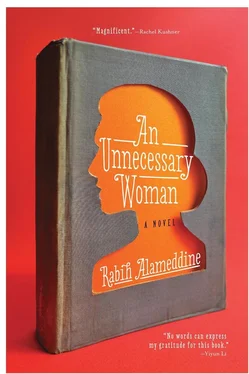I pass a sign that says SALON AALIYA in Arabic lettering, though its Roman alphabet counterpart says SALON BEYONCÉ. I don’t know whether to laugh or cry. There are no customers in the barber chairs.
It feels colder. The last traces of autumn are rising and disappearing. I clutch my handbag close. I’m no longer perspiring, of course, but moisture still clings to the valleys between my fingers.
A sandwich shop pumps the smell of garlic into the street. I’m hungry. I can’t tell whether it’s lunchtime yet or whether it has passed. I forgot my watch, not so unusual since my retirement.
This neighborhood is a rabbit warren, at least what I imagine a rabbit warren might be, but it doesn’t compare with the ever-changing mazes of the Palestinian camps. It feels more solid. I probably see a chasm of difference because of familiarity. I haven’t been to Sabra since I went looking for Ahmad all those years ago. I may not walk this neighborhood regularly, but I know it. It’s changed some since I was here last, but it’s recognizable, inherently so. The neighborhood I grew up in lies not far from here — not a stone’s throw, a mortar’s launch.
There were quite a few launches a couple of years ago. In 2008, the Shiites and Sunnis— a plague o’ both your houses —clashed briefly and violently along these streets. Traces of the shooting can be seen on the buildings, a few bullet holes on one, two blotches on the second floor of another, a single beauty mark on a third, residues on edifices that can’t afford plastic surgery. No trace of the psychological scars those battles caused can be found on any Beiruti, however. We suppress trauma so very well. We postpone the unbreathable darkness that weighs us down.
How do I talk about the betrayal we felt when Lebanese killed Lebanese once more? For years, since the end of the war in 1990, we deluded ourselves into thinking that we’d never fight each other again. We thought we’d buried our horror. Yet the Lebanese do not wish to examine that period of our history. We, like most humans, consider history a lesson on a blackboard that can be sponged off. We’d rather ostrich life’s difficulties.
I can dig out the old chestnut from George Santayana, that “those who cannot remember the past are condemned to repeat it,” but it serves no purpose. It’s a hopelessly optimistic quote. We are condemned to repeat the past whether we remember it or not. It is inevitable; just ask Nietzsche (eternal return) or Hegel (history repeats itself) or James McCourt (history repeats itself like hiccups).
Beirutis are intricately woven into their city’s wars.
I’m fond of Mark Twain’s quote: “History doesn’t repeat itself, but it does rhyme.”
We’re traumatized every time the Israelis go on one of their macho homicidal binges, but we explain it away. They are not us. It’s the price we pay for living next to a neighbor who constantly has to prove how big his endowment is. It is big, trust me, nuclear even. The destruction our neighbors inflicted on us in 2006 was monumental — no, I shouldn’t use that adjective, which implies raising instead of razing. The southern suburbs of our city were nearly wiped out, hundreds if not thousands were killed. They bombed every bridge in the country, every electric plant. I refused to leave my house even though my neighborhood was in no danger of being bombed. Yet as horrifying as that was, like most Beirutis, I dismissed all this as the insanity of the Israeli military and the lunatic fringe of Hezbollah meeting head-to-head. O Poseidon, grant that these sackers of cities both find troubles in their households.
Two years later, in 2008, when the clashes between Shiites and Sunnis erupted, I was no longer able to dismiss.
I’m sure you’ve noticed that I dislike Israel, that ridiculous pygmy state dripping with self-overestimation, yet many of the giants I respect are Jewish. There is no contradiction. I identify with outsiders, with the alienated or dispossessed. Like many nation-states, including its sister pygmy state Lebanon, Israel is an abomination.
Israelis are Jews who have misplaced their sense of humor.
I like men and women who don’t fit well in the dominant culture, or, as Álvaro de Campos calls them, strangers in this place as in every other, accidental in life as in the soul. I like outsiders, phantoms wandering the cobwebbed halls of the doomed castle where life must be lived.
David Grossman may love Israel, but he wanders its cobwebbed halls, just as his namesake Vasily wandered Russia’s. To write is to know that you are not home.
I stopped loving Odysseus as soon as he landed back in Ithaca.
I love the idea of homeland, but not the actual return to one.
A while back Czesław Miłosz wrote in an essay that in today’s age of technology and mass mobility “the whole nostalgic rhetoric of patria fed by literature since Odysseus journeyed to Ithaca, has been weakened if not forgotten.” Weakened, possibly, but I think not forgotten. It is that longing for a mythical homeland, not necessarily a physical one, that inspires art. Without that longing, patria is nothing more than the name of a Finnish company that produces armored vehicles used by Israel in its wars on Lebanon, or the name of an Argentine submachine gun.
I appreciate longing.
I also appreciate irony.
In the summer of 1982, while Israeli armored tanks and gunships imposed a siege of another age on rampartless Beirut, cutting off the water supply and food shipments, the modern catapults, the air force, leveled residential buildings, destroyed all infrastructure, and, amazingly, bombed the synagogue of Beirut’s Jewish neighborhood.
There is no contradiction.
I notice a mother sitting on the pavement across the street, not Lebanese, as shows in her face, and not from this neighborhood, as shows in her haggard dress. A beggar by profession, she’s surrounded by the tools of her trade: a baby in her arms; a girl of about five with dirty dress and knees, hovering in the world of her mother; the eldest, a girl of no more than ten, sitting on the ground, back against the building wall as she examines me from afar. The grim out-of-a-fairy-tale mother nudges her eldest, who jumps up and charges toward me in one smooth, experienced sweep. Brown hair, grimy face, and pink cheeks, she seems determined and overly earnest. Her eyes gleam with a heavy dose of resolve, a predator sighting her prey.
Except this quarry is prepared for her.
I wait until she comes around a parked car, until she’s upon me, before I stop her by extending a demanding palm and saying, “Can you spare some change? I’m terribly hungry.”
Her body reacts before her face, a lapse of a few seconds, recoiling. She practically lands on the blue Nissan to her left. The eyebrows lift, her lower jaw drops, her lips thin out, her cheeks flush puce. She uses the car as a support, leans on it with outstretched hand. It’s then that I notice she’s younger than she first appeared, a tall eight-year-old, probably.
I wonder if I went too far, but no, her recovery is quick.
Her eyes smile first, bright girl. She breaks out giggling. Her laughter comes at me as if by catapult, and her gaze holds me transfixed. She examines me with mirth. I grin.
Her fidgeting mother across the dividing bitumen doesn’t seem to be appreciating our peculiar scene and its urban charm. Her anxiety is palpable across this great distance. She pulls her five-year-old close, her right arm encircling the little girl’s hips.
“You have blue hair,” my girl says.
In an effusive gesture, I reach into my handbag and hand her all the paper money I have — everything I have except for what’s in my pocket, where I keep my real money in case my purse gets stolen. I end up giving her just a little more than the price of museum admission. I’m not stupid, romantic, or a busy Russian novelist.
Читать дальше












